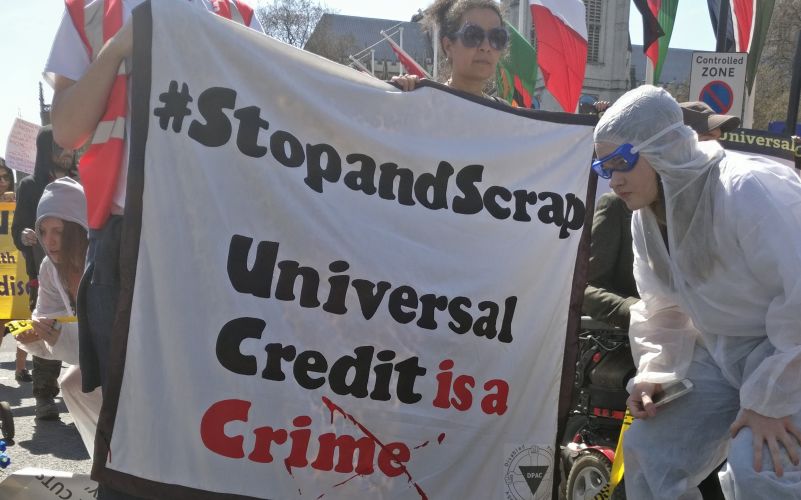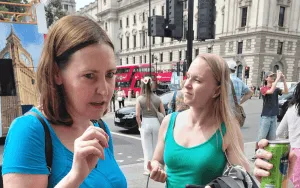The government’s new universal credit benefit system could have “disastrous” consequences for disabled people if ministers fail to make a series of major changes, according to a committee of MPs.
A report by the Commons work and pensions committee highlighted major flaws in the government’s plans to move disabled people onto universal credit.
Frank Field, chair of the committee, warned that the introduction of the new system risked forcing disabled people “further into poverty, deprivation, miserable hardship”.
Disabled activists have repeatedly warned that universal credit – which combines six income-related benefits into one – is “rotten to the core”, with “soaring” rates of sanctions and foodbank use in areas where it has been introduced, and repeated warnings about its impact on disabled people.
The work and pensions committee says in the new report that those disabled claimants not designated “severely disabled” will be “substantially worse off” under universal credit because of the scrapping of the severe disability premium and enhanced disability premium.
But the report also suggests that this will mean that even claimants with higher support needs – a group the government claims it is targeting with higher payments under universal credit – who previously received these premiums will receive less under the new system.
The report says: “The Department argues it is, instead, making support for the most ‘severely disabled’ UC claimants more generous than under the legacy system.
“This is true, but it still does not match what those claimants could have received under the legacy system, with the premia in place.”
The committee was unable to clarify yesterday (Wednesday) whether this meant that it believed disabled people who received the premiums would be worse off under universal credit.
A Department for Work and Pensions (DWP) spokeswoman also refused to say whether the committee’s statement was correct.
Although DWP is providing “transitional protection” for those moving from existing disability benefits and premiums onto universal credit, this will not apply to new universal credit claimants, while the protection will lose value over time.
The report says that removing the “vital additional support” provided by the premiums “risks disabled people living more isolated lives, relying more on unpaid care (including from their own young children), or simply being unable to gain support to complete basic daily tasks”.
The committee points out that DWP has carried out no analysis of the financial impact of removing the two premiums on disabled people and calls for it to do so “urgently”.
The MPs say DWP should include in this analysis “clear worked examples” of the financial support that disabled people claiming different benefits under the old system will receive under universal credit.
Disability News Service is currently attempting, through a complaint to the information commissioner, to force DWP to provide similar information.
The committee’s report also says – repeating its recommendation from an earlier report on benefit sanctions – that universal credit claimants who are waiting for their work capability assessments (WCAs) should not be forced to accept strict conditions while they are waiting if they can provide a valid “fit note” from their doctor stating that they cannot work.
Such a step would restore a “vital safeguard” that “protects claimants from having to meet conditions that may be unmanageable and inappropriate”, the report says.
The report says the move to universal credit will leave 100,000 families with disabled children worse off than they would have been under the previous system.
And it says that only a third of disabled people making new universal credit claims receive their first payment in full and on time, because of delays in arranging WCAs.
The MPs also warn that the simplified process for universal credit claimants who are terminally-ill is failing many people who are forced to prove they have less than six months to live to qualify for the fast-track procedure.
The committee calls on DWP to introduce “a more humane approach”.
And it says that it is “entirely unacceptable” that DWP has failed to ensure that its online universal credit service is compatible with some of the most basic assistive technologies that disabled claimants might use.
It calls on DWP to delay moving disabled people from existing benefits onto universal credit – which is supposed to be “digital by default”, with the vast majority of interactions with DWP taking place online – until this work has been done.
The report also points out that the availability of assistive technology on jobcentre computers is “too often patchy and poor”.
In response to the report, a DWP spokeswoman said in a statement: “More than a million disabled people will be better off by £100 a month under universal credit and £3 billion of funding will help protect families as they move over from the old system.
“Universal credit does work for the vast majority, and the managed migration regulations* are set to be debated in parliament in due course.”
But the DWP spokeswoman confirmed that the £3 billion was “for all families” and not just those with disabled members, even though the committee’s report is about support for disabled people.
*The managed migration regulations describe how DWP will treat those claimants who move from existing benefits to universal credit without a change in their circumstances. This process will begin on a pilot basis from the middle of next year, with the full rollout due now to begin in 2020 and end in 2023
A note from the editor:
Please consider making a voluntary financial contribution to support the work of DNS and allow it to continue producing independent, carefully-researched news stories that focus on the lives and rights of disabled people and their user-led organisations.
Please do not contribute if you cannot afford to do so, and please note that DNS is not a charity. It is run and owned by disabled journalist John Pring and has been from its launch in April 2009.
Thank you for anything you can do to support the work of DNS…

 Disabled MP who quit government over benefit cuts tells DNS: ‘The consequences will be devastating’
Disabled MP who quit government over benefit cuts tells DNS: ‘The consequences will be devastating’ Minister finally admits that working-age benefits spending is stable, despite months of ‘spiralling’ claims
Minister finally admits that working-age benefits spending is stable, despite months of ‘spiralling’ claims Timms says cuts must go ahead, despite being reminded of risk that disabled claimants could die
Timms says cuts must go ahead, despite being reminded of risk that disabled claimants could die